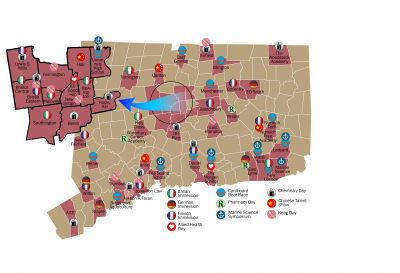By Jessica Dunn
Photos by Gordon Daigle and Michael Illuzzi
On September 19th, UConn ECE hosted the annual Avery Point Cardboard Boat Race with the thrilling theme “You’re Gonna Need a Bigger Boat,” celebrating the 50th anniversary of Jaws. This year’s challenge invited students to channel their creativity and engineering skills into crafting cardboard and duct tape vessels that could float and hopefully survive the waves! The event drew 17 high schools from across the state, with 31 boats competing and more than 450 participants cheering from the shoreline.
From sleek speedboats to jaw-dropping shark themed designs, the ingenuity on display was nothing short of impressive. Adding to the excitement, Jonathan XV made a special appearance, bringing school spirit and plenty of photo opportunities. The race was filled with suspense, laughter, and unforgettable moments as students tested their designs against the elements. Beyond the fun and the academic morning sessions with esteemed UConn Avery Point Faculty and Graduate Students, the event highlighted teamwork, problem-solving, and the vibrant community that UConn ECE fosters among partner schools. Want to experience for the first time or relive the excitement of the boat race?


Thank You to our Participating High Schools
• Bethel High School
• Branford High School
• Bridgeport Aquaculture
• Daniel Hand High School
• East Granby High School
• Ellington High School
• Emmett O’Brien Technical High School
• Franklin Academy
• Holy Cross High School
• Ledyard High School
• Manchester High School
• The Sound School
• Stratford High School
• Terryville High School
• The Morgan School
• University High School
• Waterford High School
Heat 1 Trophies
#1 Waterford High School – Bruce 2
 #2 Ellington High School – Silver Bullet
#2 Ellington High School – Silver Bullet
#3 BRASTEC – Bruce
Heat 2 Trophies
#1 Holy Cross High School – Totally Jawsome
#2 The Morgan School – Finley
#3 University High School – Meg-a-lodon
Heat 3 Trophies
#1 Bethel High School – We’re Gonna Need a Bigger Boat
#2 Waterford High School – Amityville Tourist
#3 Ellington High School – Barknado
Heat 4 Trophies
#1 Waterford High School – Sharky
#2 Ledyard High School – The Fin-isher#3 Bethel High School – Bruce
Championship Race
Holy Cross High School – Totally Jawsome
Best Visual Design Award: The Morgan School (Finley)
Best Boat Name Award: Manchester High School (The Pawseidon Adventure)
Interdisciplinary Collaboration Award: East Granby High School (Chum Runner)
People’s Choice Award: University High School (Meg-a-lodon)


Scan QR code to view
the “Ellington Armada – Keeping Knowledge Affloat” video









 By Dr. George Chunsheng Yang | Photos by Gordon Daigle and Mike Illuzzi
By Dr. George Chunsheng Yang | Photos by Gordon Daigle and Mike Illuzzi ia sessions, keeping the audience entertained and engaged throughout the event.
ia sessions, keeping the audience entertained and engaged throughout the event.